impactful career.

sector.

Equity-driven, collective leadership is a powerful lever for advancing health equity. Global Health Corps exists to harness and cultivate it.
GHC recruits and places young professionals from a wide range of backgrounds to serve for 13 months in high impact roles on the front lines of global health. Currently, we place fellows in Malawi, Rwanda, Uganda, and Zambia. Here’s a snapshot of our fellowship program model this year:
Of the thousands who applied for our 2021-2022 cohort, we could only accept ~2%.
18 organizations in 4 countries directly benefited from GHC’s talent pipeline through our fellowship program.
We designed and facilitated hundreds of hours of leadership and management trainings for fellows.
We provided $45K+ in flexible professional development funds to fellows.
76 fellows connected with alumni mentors through GHC’s community mentorship program.
GHC’s intensive leadership development program equips alumni to drive systems change, advance in their careers, and collaborate for greater impact through offerings including:
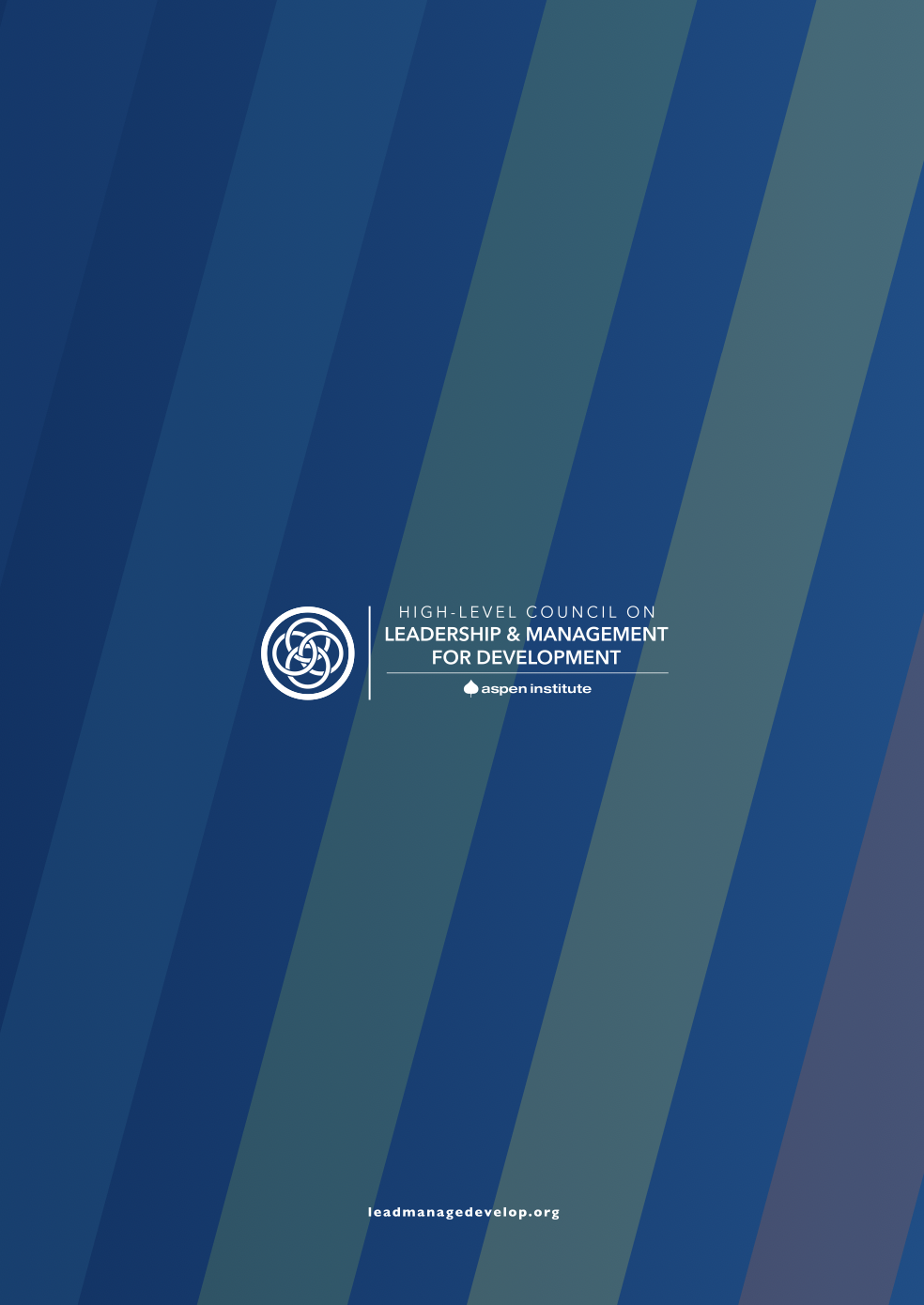
“…cultivating leaders and managers does not happen through magic, but through consistent collective action, prioritization, and investment. There is an urgent need for meta-leadership, for leaders who understand the importance of leadership and can advocate for the resources needed to develop leadership and management capabilities, at all levels and across all sectors.”
—The Aspen Institute, High-Level Council Report on
“Investing in Public Sector Leadership and Management to Accelerate Sustainable Development”
November 2021
The intersecting crises of 2020 and 2021 underscored the importance of diversifying global health leadership. Making sustained investments to build the skills and networks of those most impacted by inequities is key to driving systemic change. This year, GHC continued to intentionally recruit and place talented young leaders from a wide range of backgrounds and skill sets.
Throughout this year, the GHC team also dedicated time and space to reflect on how to more fully live out our commitment to diversity, equity, and inclusion. We made intentional shifts in our programming, in how we operate internally, and in how we use our platforms to highlight intersectionality, pass the mic, and interrogate harmful power dynamics.
A Fireside Chat with Dr. Senait Fisseha
Busting Myths About Women in Leadership
Exploring the Intersection of Systemic Inequities
Leading Across Difference, Discord, and Distance
Remembering the Past and Resisting With Joy
Reflecting on Our Journey & Our Values
The long emergency of the pandemic underscored that health systems are complex and dynamic. They are created and shaped by human beings, who are also complex and dynamic, which means that assessing exactly how leadership development for systems change occurs is challenging. It defies current frameworks of monitoring, evaluating, and communicating impact in global health.
Yet we believe this work matters. So in 2019, we created a new Theory of Impact in partnership with Amy Lockwood, MBA, PhD from the University of California, San Francisco. Our unique model measures influence, collaboration, and excellence within the context of a diverse community.
This year, we expanded our impact in each of these areas towards the goal of mobilizing a generation of leaders to transform health systems:




Constancia Mavodza and Alice Bayingana
2021 Women Leaders in Global Health Conference
Heather Anderson, Brittany Cesarini, Ruth Achillah, Mweene Chibbonta, and Bailey Borchardt
2021 Women Leaders in Global Health Conference
Georgie Denis
D/srupt Magazine
Solange Impanoyimana and Bonita Beatrice Nanziri
Sexual Health Equity Panel
The pandemic has illuminated the need for a more community-based, people-centered approach in global development, and GHC is well-positioned to meet that need. The 2021-2022 fellows were GHC’s second cohort comprised entirely of African nationals — Malawians, Rwandans, Ugandans, and Zambians deeply committed to bringing their expertise and passion to achieve health equity in their communities and their nations.
While uncertainty around the trajectory of COVID-19 led us to pause on recruiting American nationals for this cohort, we were committed to continuing to invest in proximate leadership. Our national fellows’ local social support networks and familiarity with their work contexts allowed them to add capacity to organizations during a critical time.
Languages Spoken
new to the field of global health
Average Age
have applied to GHC in previous years
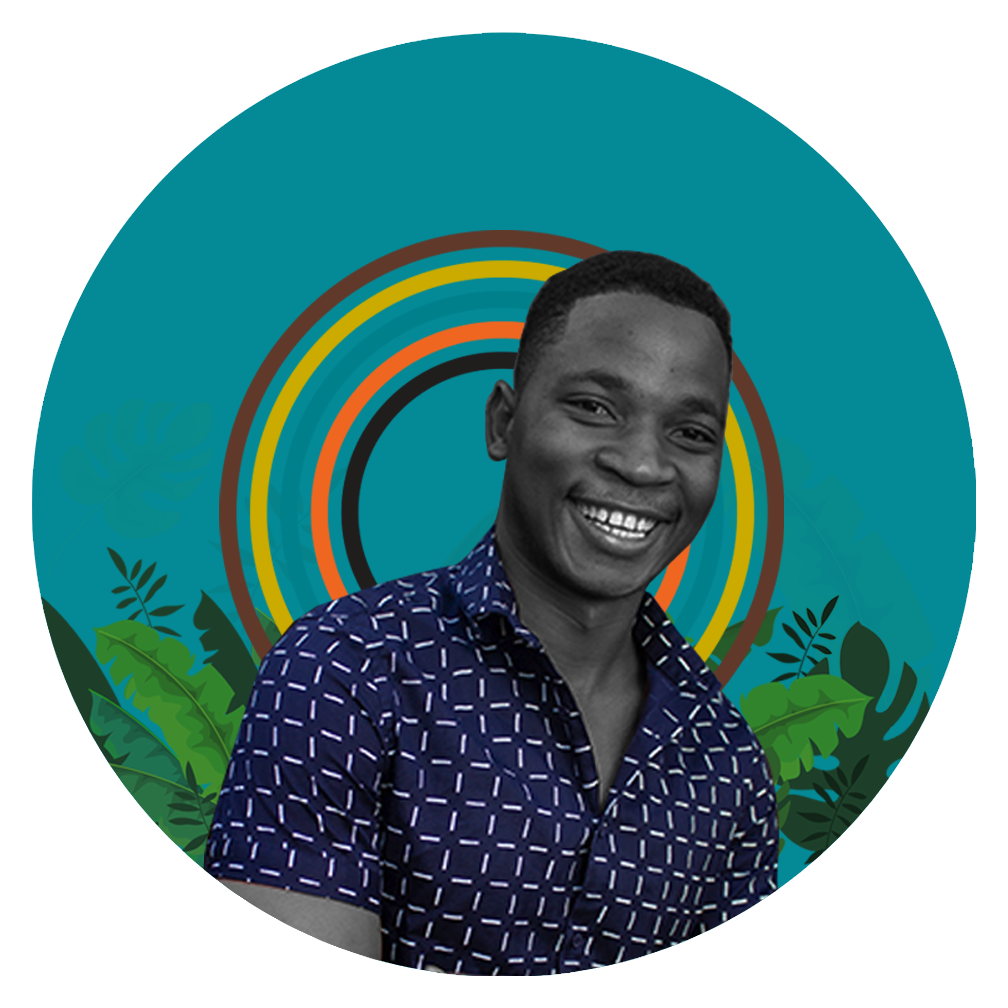
A native of Lilongwe, Gilbert Kondani brings a background in data science and software engineering to the health equity movement. Through GHC, Gilbert is accessing global platforms to share his many ideas for digital health and to connect with a network of like-minded leaders. He is committed to developing as a leader to advance his vision for a strong health system that serves all Malawians. As Informatics Specialist at Partners in Health, Gilbert is developing systems for accurate forecasting and supply chain management. He is also supporting community health teams with implementations of electronic systems to streamline clinical processes for better quality of care.
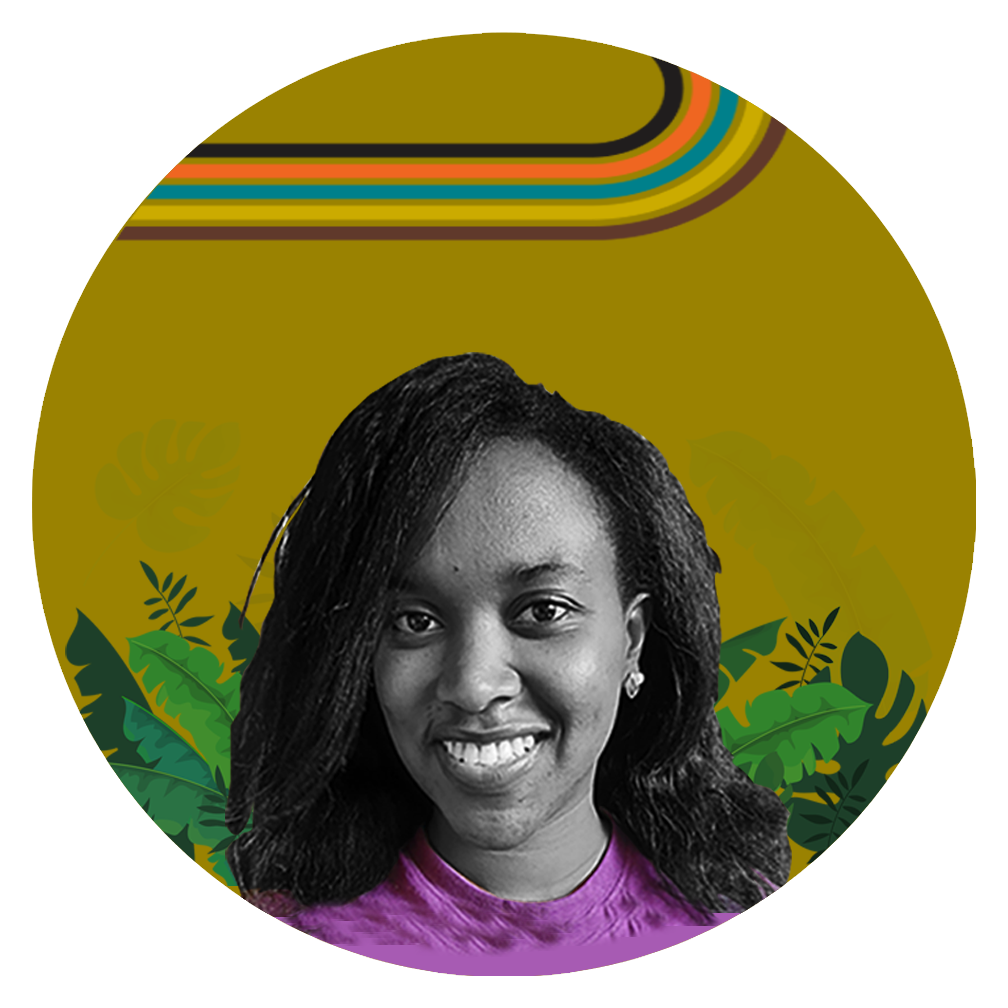
Hailing from Kampala, Gracious Ahumuza’s commitment to health equity is rooted in her passion for community. Skilled at identifying inequities and proposing evidence-based solutions, she brings strong research and policy acumen to advance sustainable, systems-level change. Gracious is prioritizing evolving her leadership skills through the lens of social justice during her fellowship. Less than six months into her fellowship, Gracious has worked closely with the World Health Organization to lead the rollout of Uganda’s National Physical Activity Guidelines. She has also served as the point person on a collaboration between the United Nations Development Programme and the Ministry of Health to catalyze a multi-sectoral approach to control non-communicable diseases.
As the COVID-19 pandemic forged on, limiting chances to gather in person, the GHC community continued to adapt in how we show up for each other this year. As a team, we flexed our curriculum and approach to provide our fellows and alumni with exceptional leadership development training, coaching, mentorship, network building, and resources to amplify their impact.
Leaning into our organizational values of inclusive collaboration and continuous learning during the pandemic, we hosted conversations about the global health sector-at-large. We brought together hundreds of our leaders and partners to examine the impact of racism on health outcomes, amplify the voices of women in leadership, take stock of vaccine apartheid, and more.
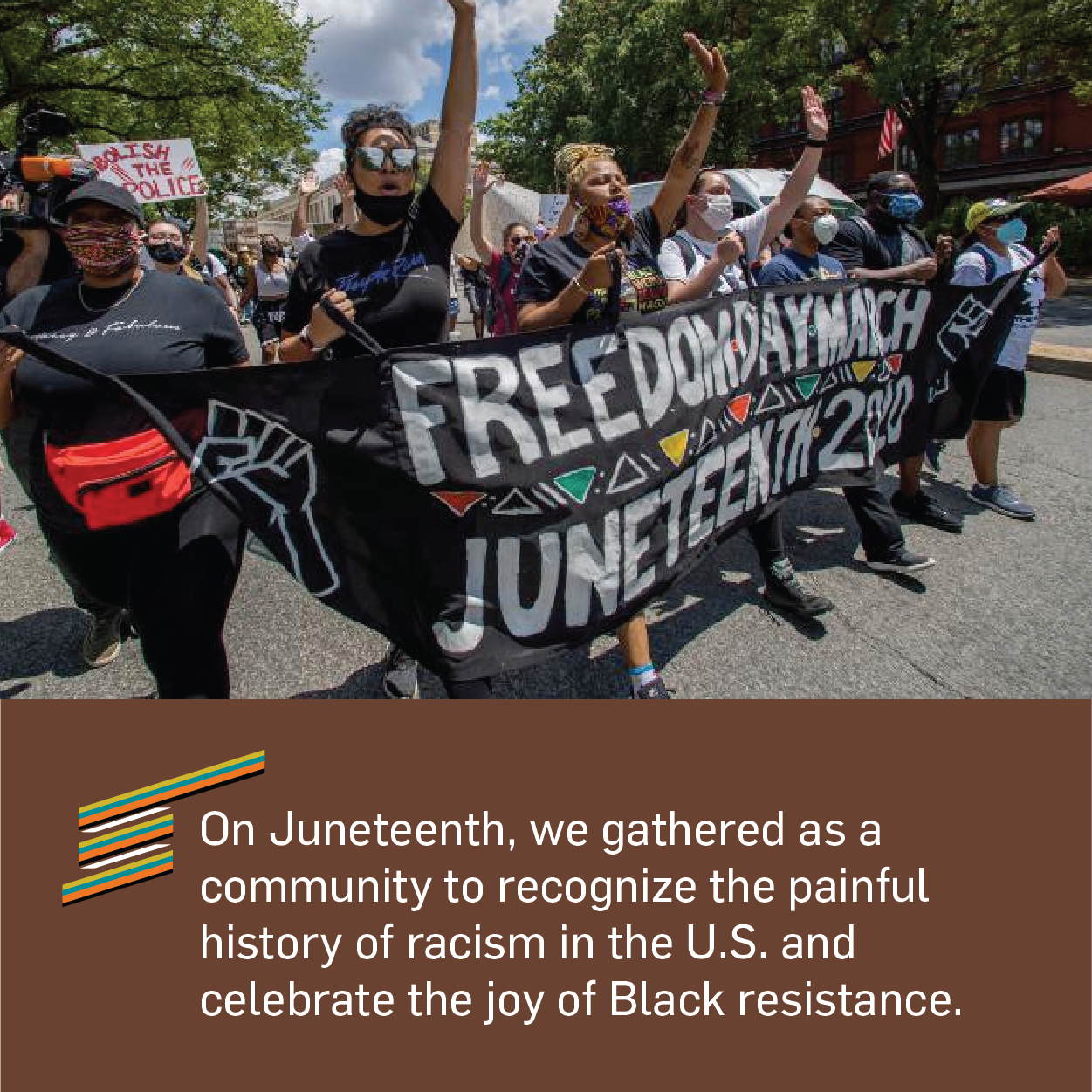
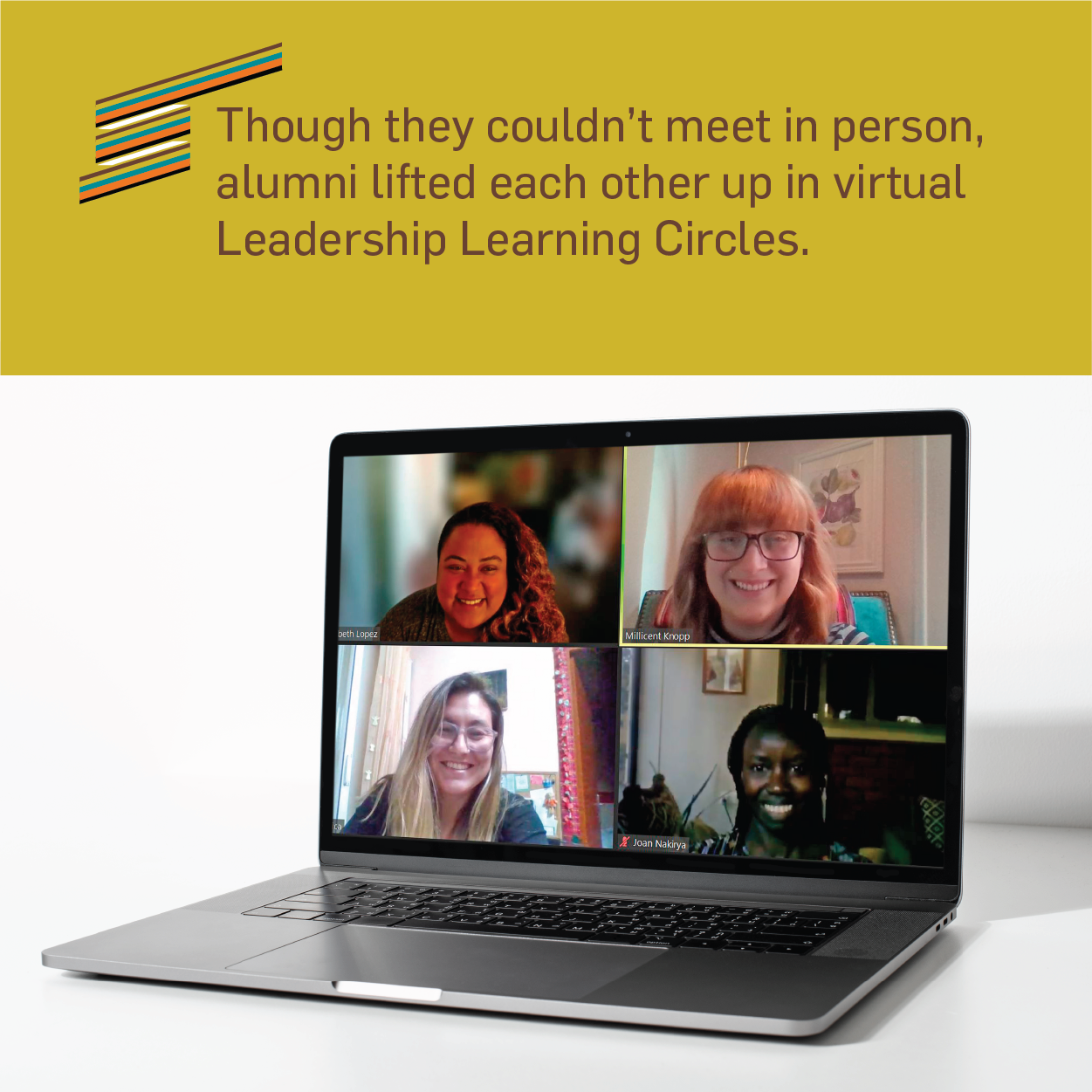
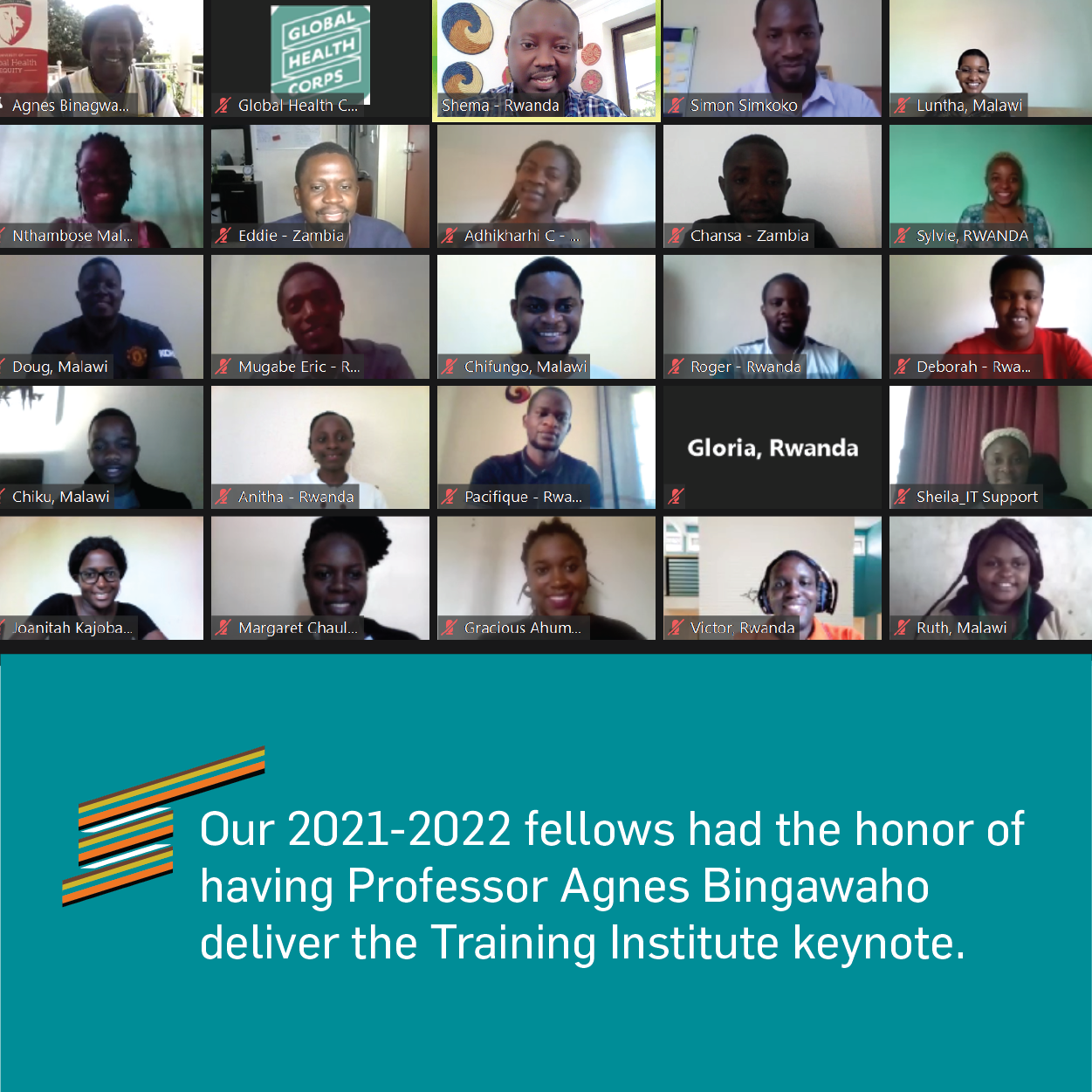
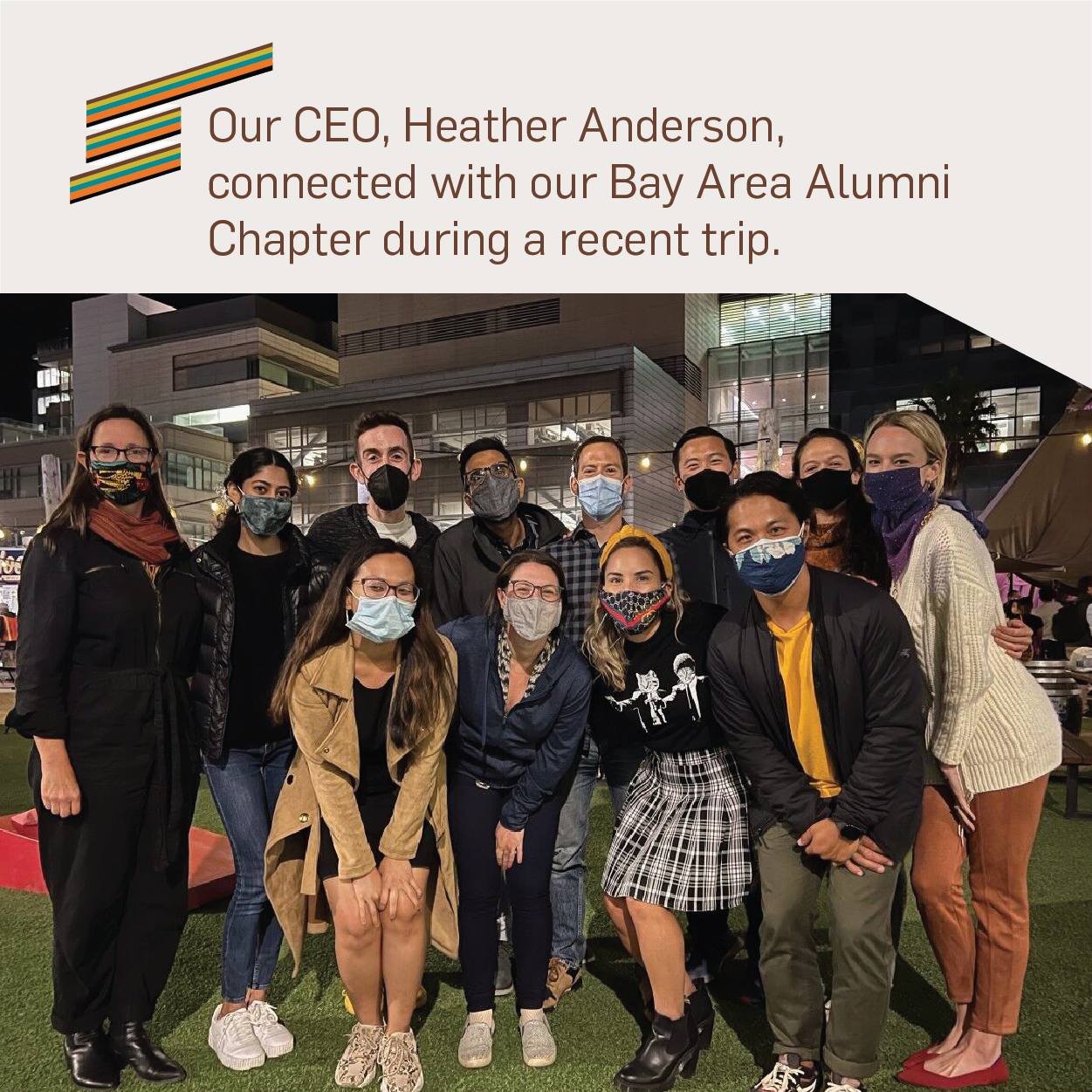
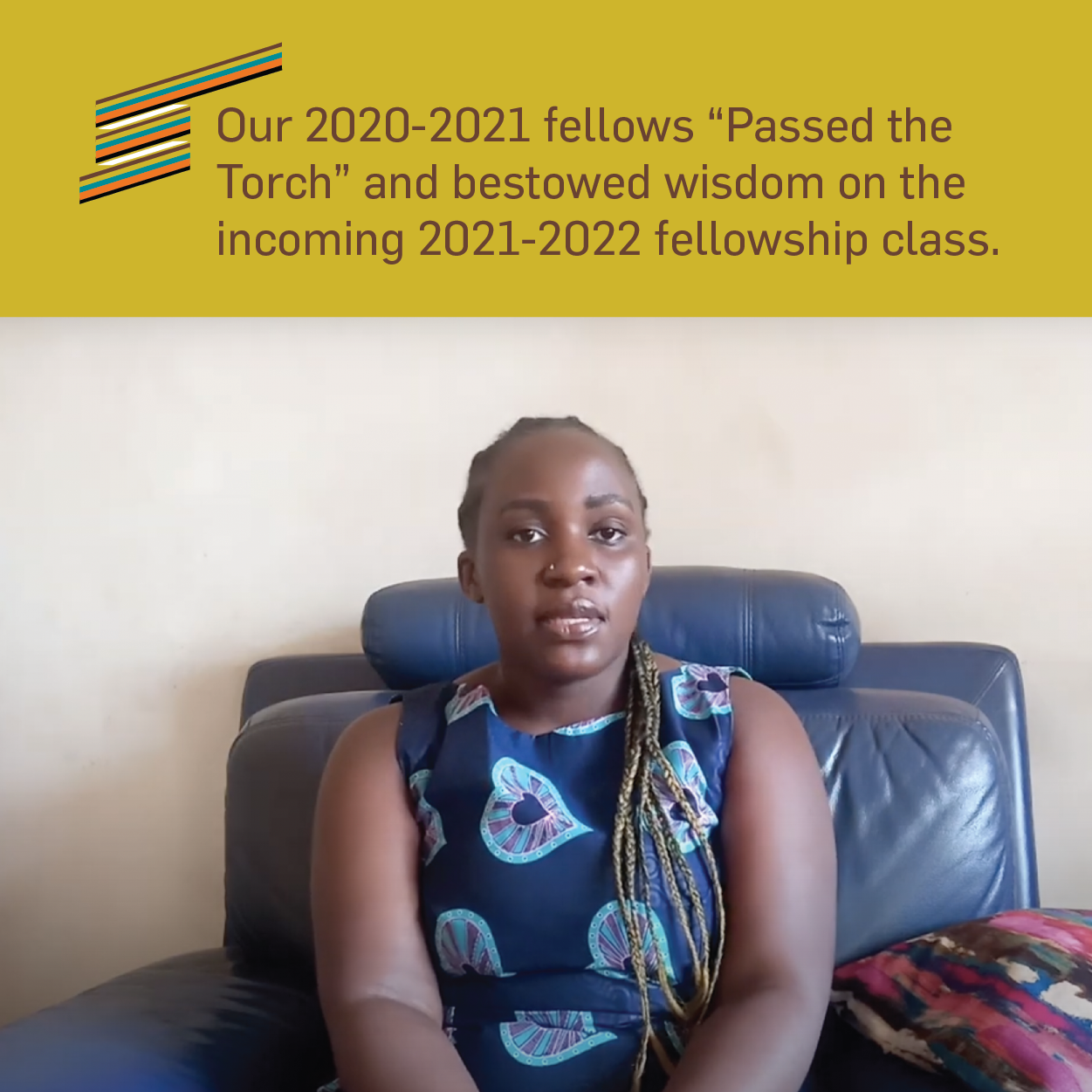
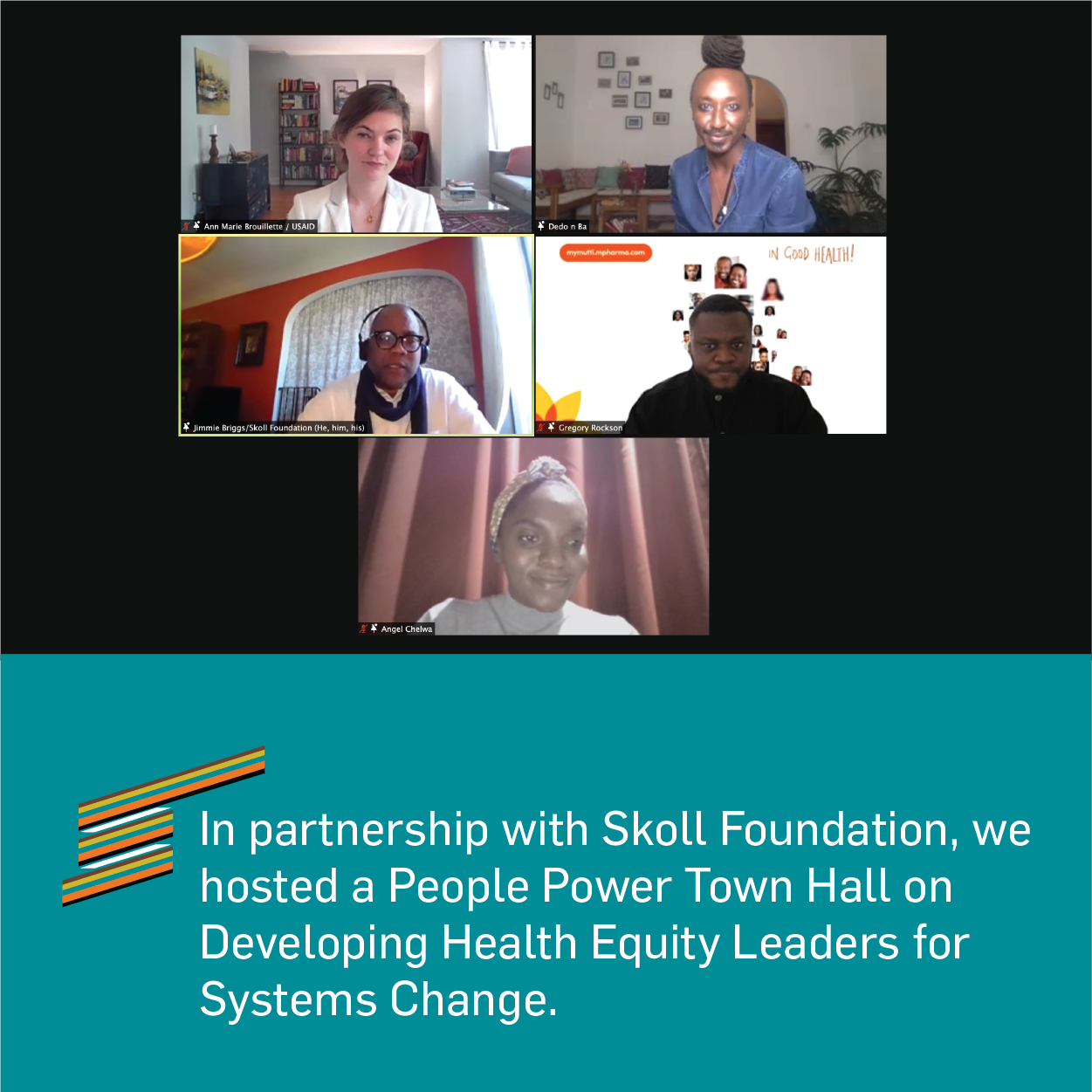
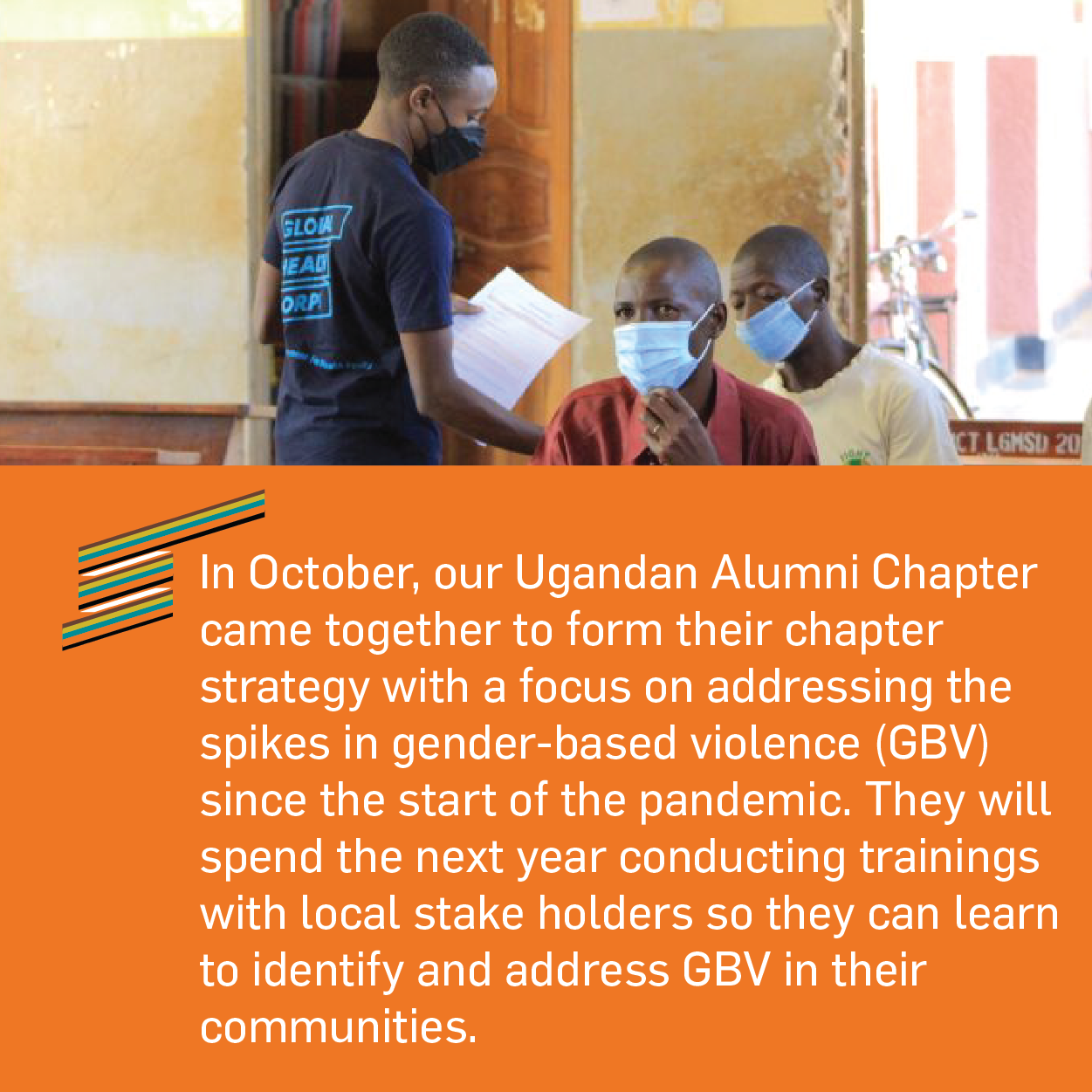
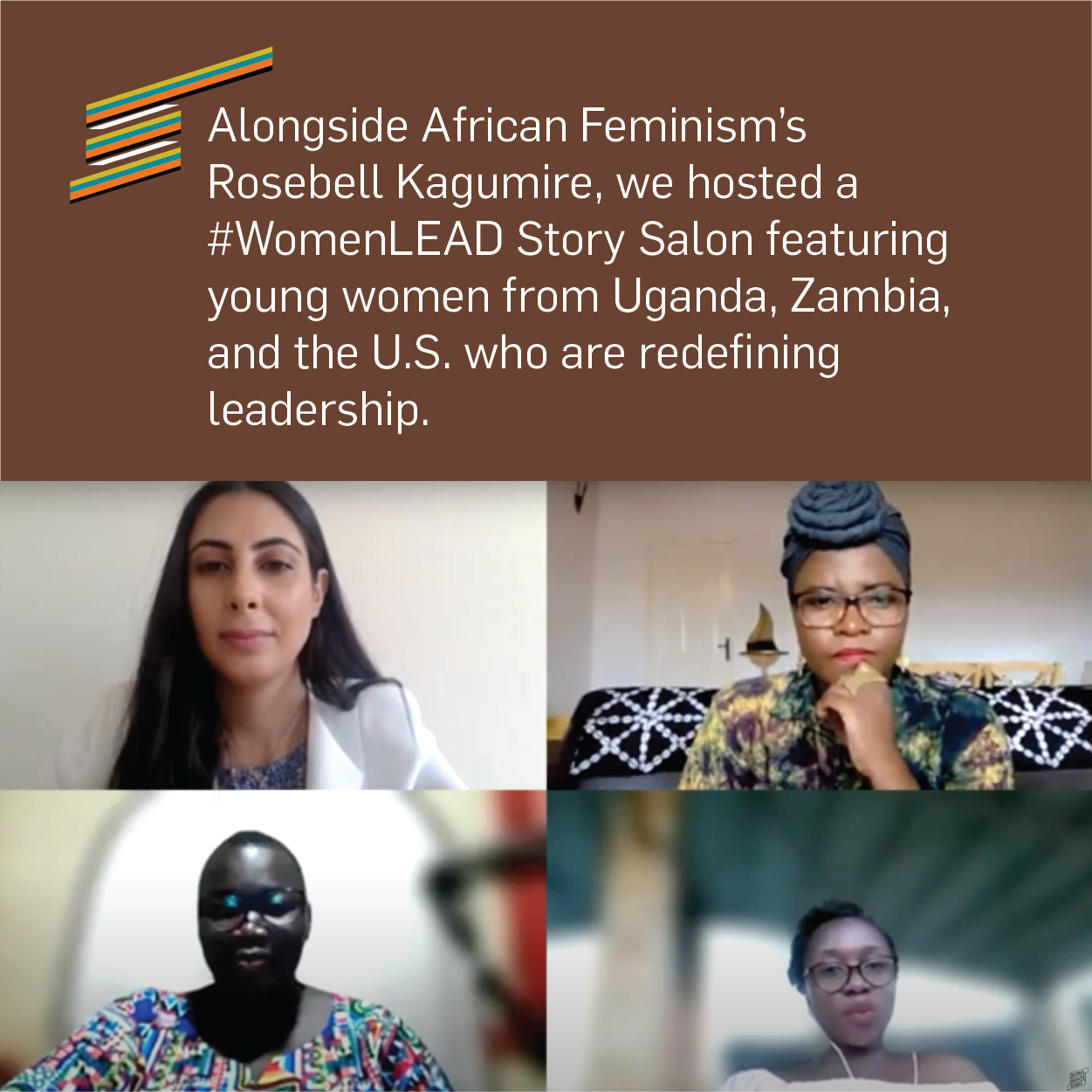
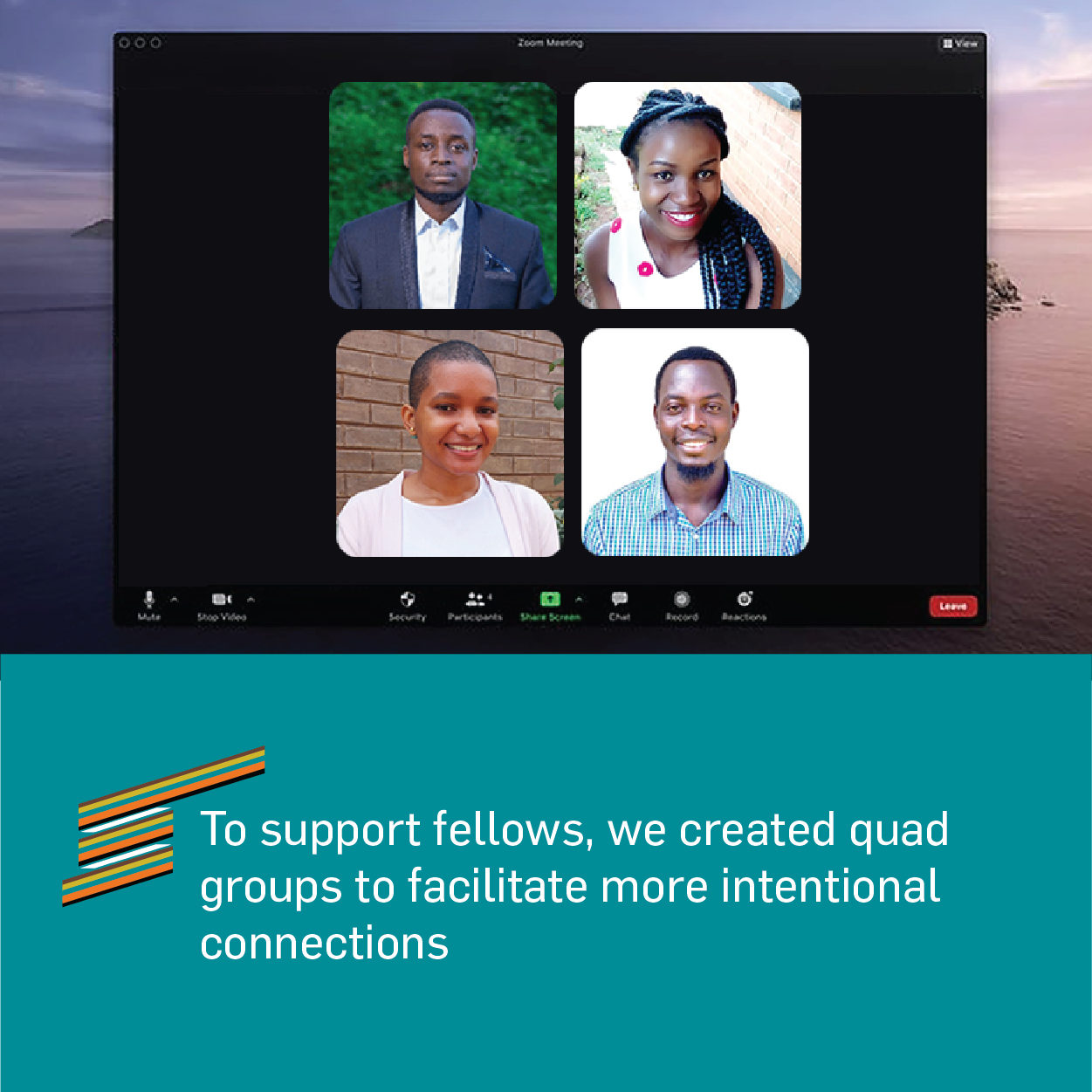
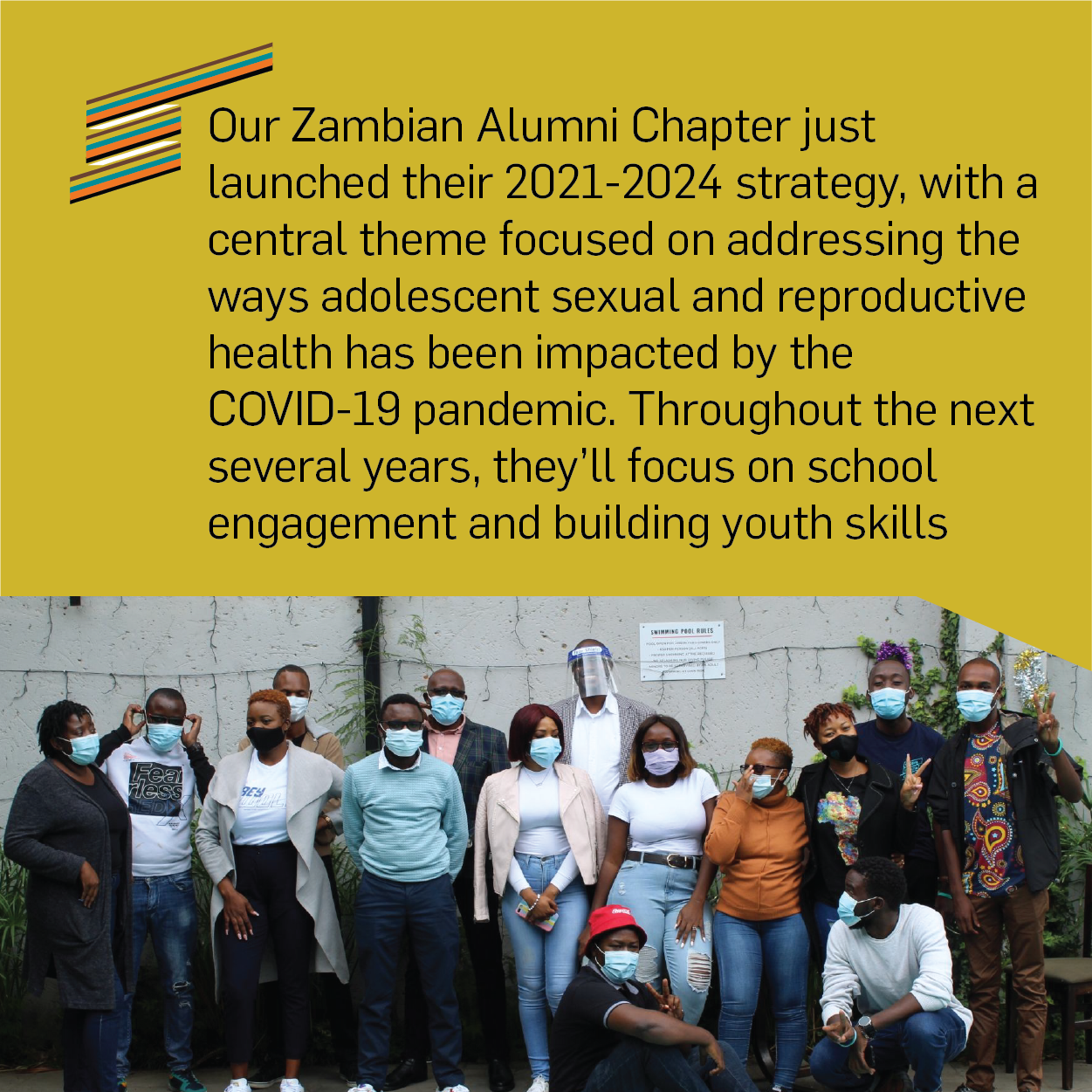
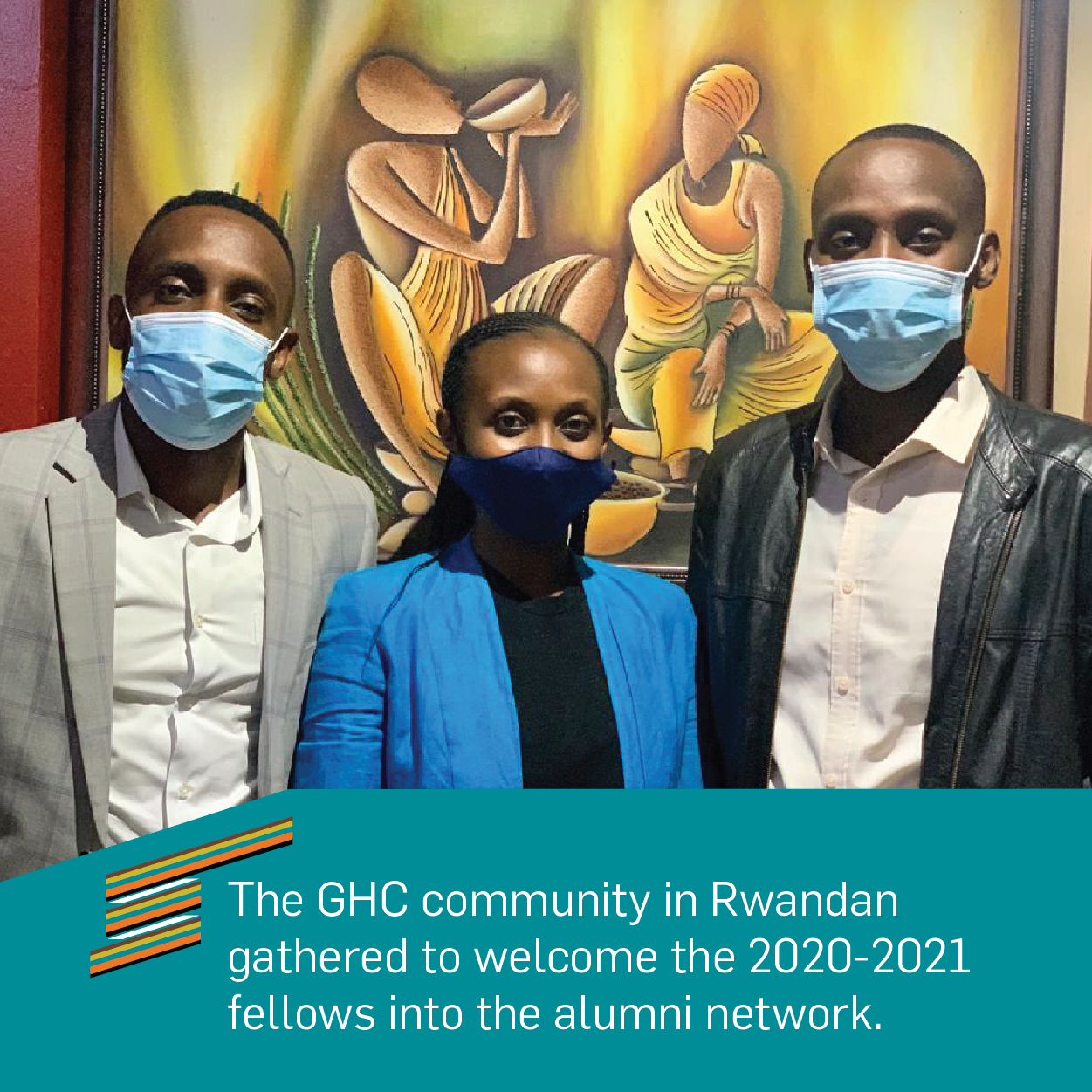
As COVID-19 continues to ravage the globe, strengthening the non-clinical health workforce is critical to improving the provision and delivery of health services around the world to respond to the pandemic and prepare for future crises. For example, syringe shortages threaten to leave millions of children across Sub-Saharan Africa without access to life-saving vaccines for common childhood illnesses. Recruiting and training non-clinical professionals to effectively meet these kinds of systems challenges has been central to GHC’s work since 2009.
During the pandemic, GHC’s ability to provide access to a critical talent pipeline has proven especially valuable for our partners. More than 50% of 2020-2021 fellows were offered a full-time role with their placement organizations upon completion of their fellowships this year.
10 generations of GHC fellows work at MASS Design Group, a team of architects, engineers, designers, artists, and researchers in 20 countries who create and advocate for “architecture that promotes justice and human dignity.” In 2021, the team worked on memorializing the pandemic as a way to both preserve memory and promote accountability.
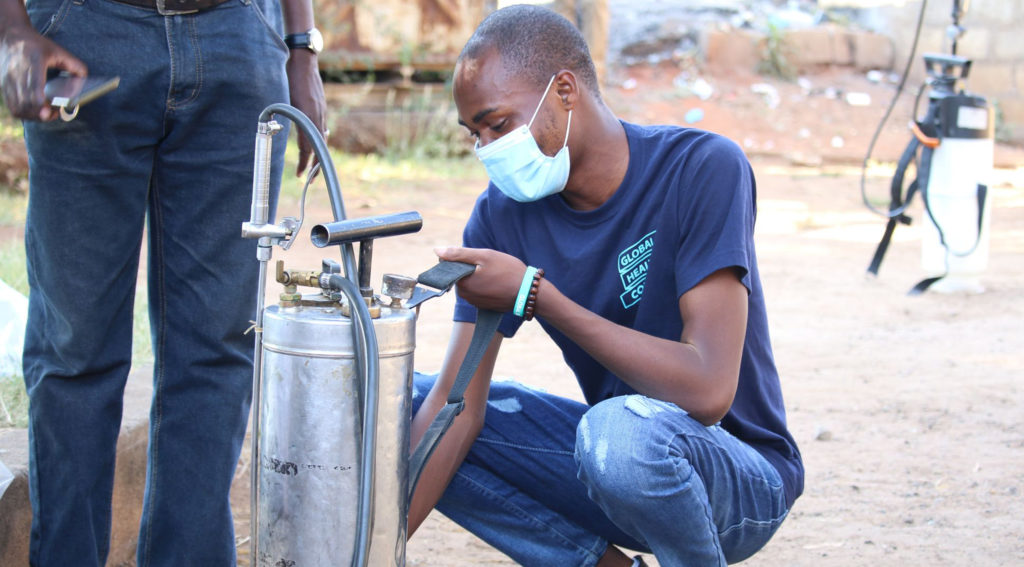
Like many of our community members, Chilowekwa Shike, 2021-2022 fellow and Communications Officer at PATH, joined GHC without prior experience in health. He’s using expertise in radio and print media to craft messages and stories to drive malaria eradication at a time of waning attention and resources for non-communicable diseases.
Mentorship is a core part of GHC’s fellow and alumni program and an integral part of connecting the many members of our ever-expanding community. Mentees gain access to personal and professional wisdom and guidance that has been proven to instill confidence, open doors, and improve career outcomes. Mentors are able to build critical leadership skills, learn from their mentees, and revisit the lessons they’re passing on.
Mentorship underpins our leaders’ ability to navigate crises like COVID-19 and build resilience. This year, they have tapped into many avenues of seeking and providing mentoring opportunities in their own communities and across our gobal network.
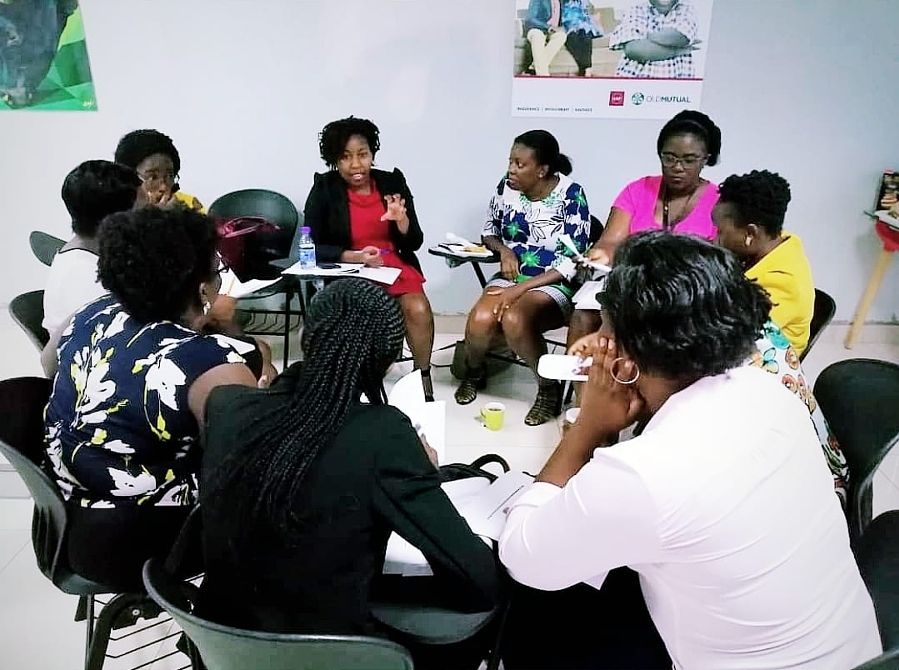
We caught up with Beatrice to discuss the importance of mentorship to her leadership journey and how she’s paying her own leadership training forward to dozens of young women in her community.
Pictured left: Beatrice, in red, leads a Mentorship Circle at Girls for Girls Uganda
BM: Looking back at my journey as a leader, from as far as I can remember, I have always had the burning desire to do more and be more in service of others. As a young woman, who, like many others, has encountered challenges as a result of gender biases, I am propelled to go above and beyond to support fellow young women. The fulfillment of seeing people shine and living up to their full potential drove me to mentorship.
BM: Mentorship is a powerful source of wisdom, understanding, and courage. It’s about telling your story authentically so that your experiences are relatable. As a mentor, I am accountable to my mentees, to society, and to myself.
Mentorship allows me to grow mutually with mentees. As I help others unleash their potential, I discover my own strengths and weaknesses. Being a mentor means offering identity, a sense of belonging, and a safe space for vulnerability and strength.
BM: Being part of GHC has taught me that leadership is about what you do and not who you are or what position of influence you hold. The #GHChangemaker phenomenon transformed my perspective as I saw the difference our community makes in the lives of many.
As a mentor, this is one of the core perspectives I share with mentees. I want them to know that their contributions in their personal and professional spheres are valuable. For the world to be a better place, we need all-hands-on-deck. Every little positive action is a step towards a bigger goal.
BM: Mentorship has the ability to transform societies and cultivate generations of empowered women leaders. Research on mentorship by the Chronus Institute reveals that 65% of women who have been mentored will go and become mentors themselves. The confidence boost that women gain as a result of mentorship drives skills development, informed career path decisions, and aligns personal life goals. It also offers an enriching life-long network. The benefits of mentorship are the backbone of leadership.
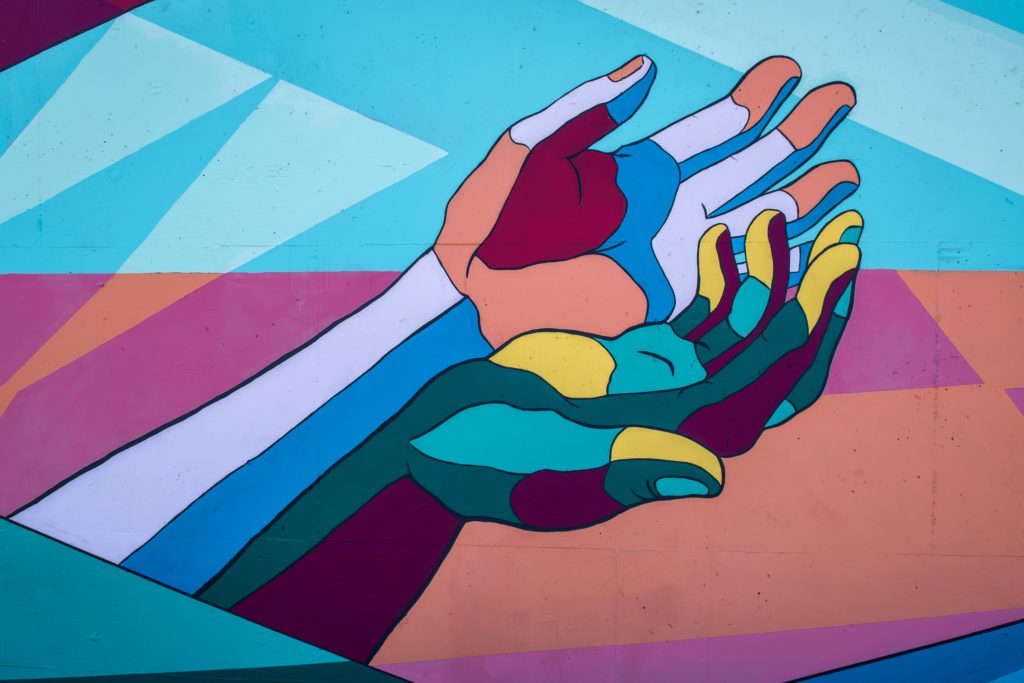
Photo by Tim Mossholder on Unsplash
The first time Ruth reached out to her assigned mentor Lara, she was met with an instant connection. Ruth, like so many young women in the early stages of their careers, was struggling with feeling under-qualified in her new role. In their first meeting, Lara shared her own experiences working to overcome doubt and insecurities. Ruth gained wisdom and confidence to tackle these challenges and ascend to a new level.
Mentorship is key to closing the gender gap that still persists in global health leadership. By connecting mentors like Lara with mentees like Ruth, we unlock the potential of rising women. In Ruth’s words: “Having a mentor means [women] have someone to guide them, help them boost their confidence, share in their fears, and encourage them. This kind of support helps women realize the power within them and they become unstoppable!”
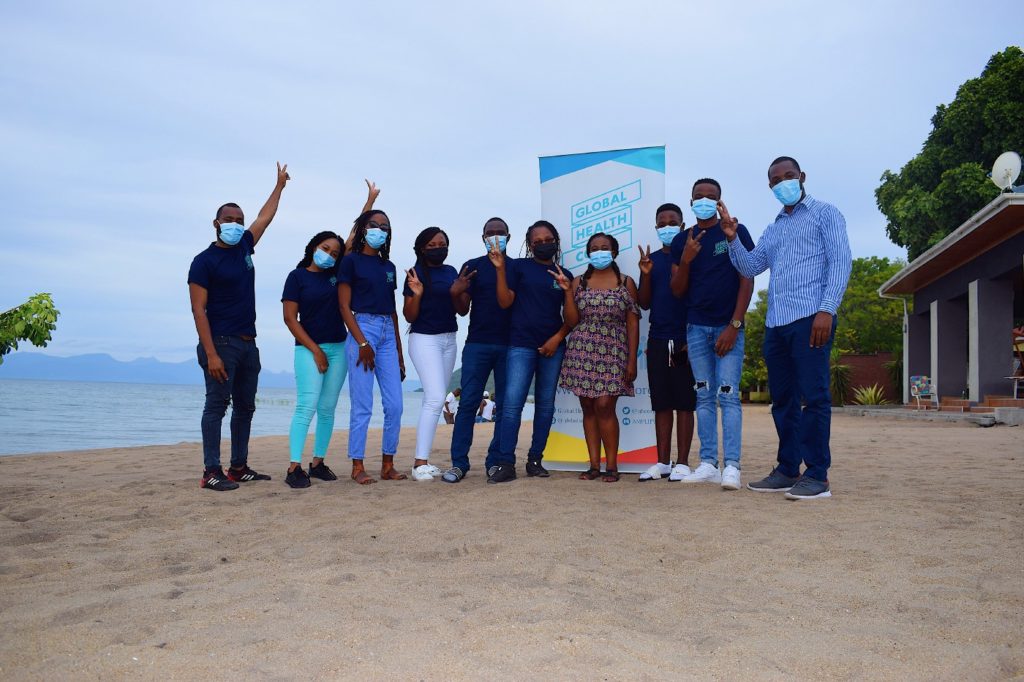
Pictured left: 2020-2021 Malawi fellows at a GHC training
When 2020-2021 Malawian fellow Hanif Munthali wrapped his fellowship, countries across Africa were facing third waves of COVID-19 outbreaks forcing the return of lockdowns. All around him, Hanif witnessed young professionals and rising leaders seeking growth and connection at a time when careers were coming to a standstill.
Equipped with his GHC training and network, Hanif sprang into action. He prepared seminar topics, coordinated logistics, and tracked down excellent facilitators. By July 2021, he ran five professional development seminars attended by dozens of young professionals across Malawi, Namibia, and South Africa. Hanif’s hope is “that those who attended will feel empowered and equipped to bring positive change to their workplaces and communities.”
As Sub-Saharan Africa and the U.S. faced intense waves of COVID-19 this year, we mobilized our community to respond to pressing needs while continuing to strengthen systems.
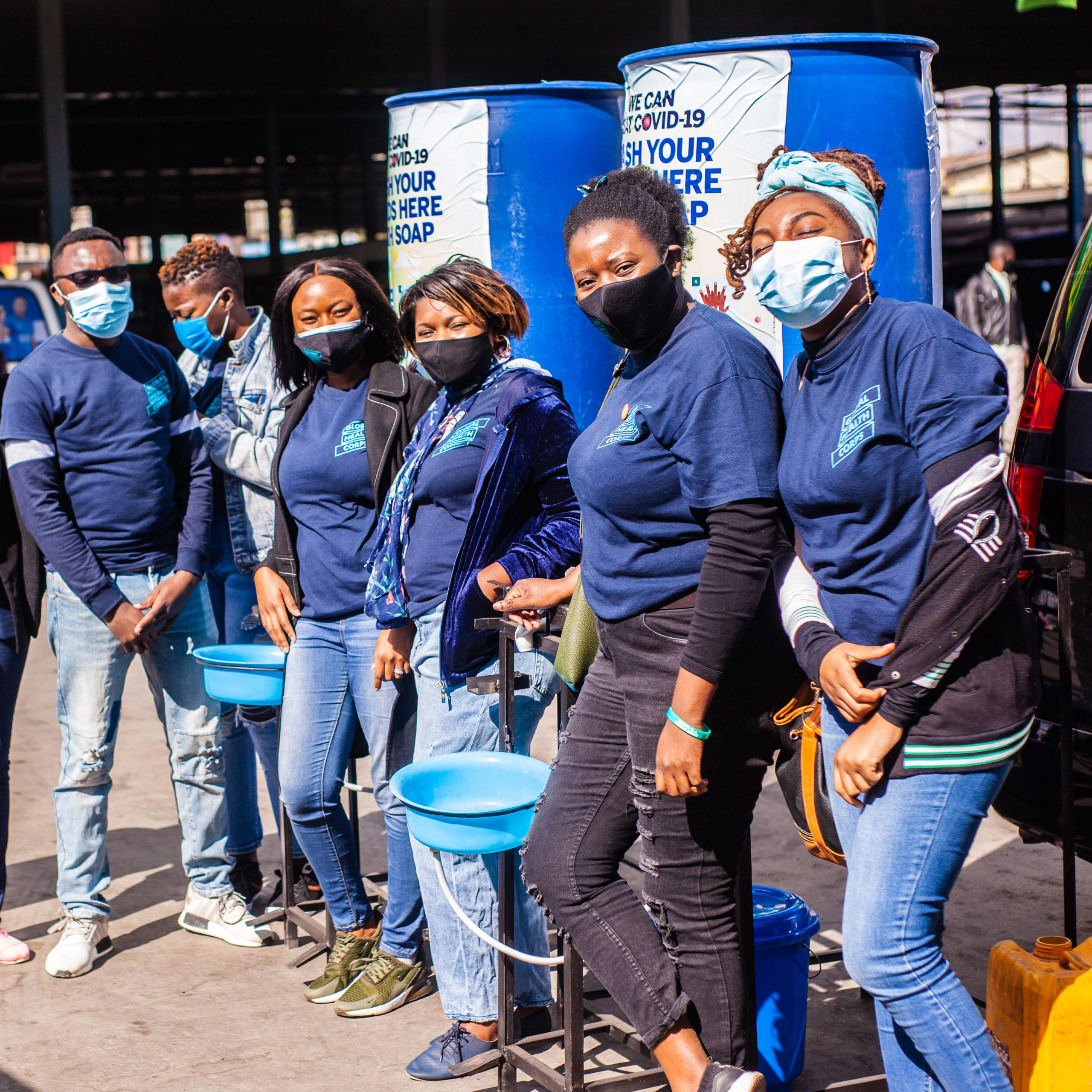
In partnership with the Ministry of Health, the Zambia COVID-19 Coalition targeted Lusaka’s transportation systems by passing out units of PPE and setting up sanitation stations near major hubs.
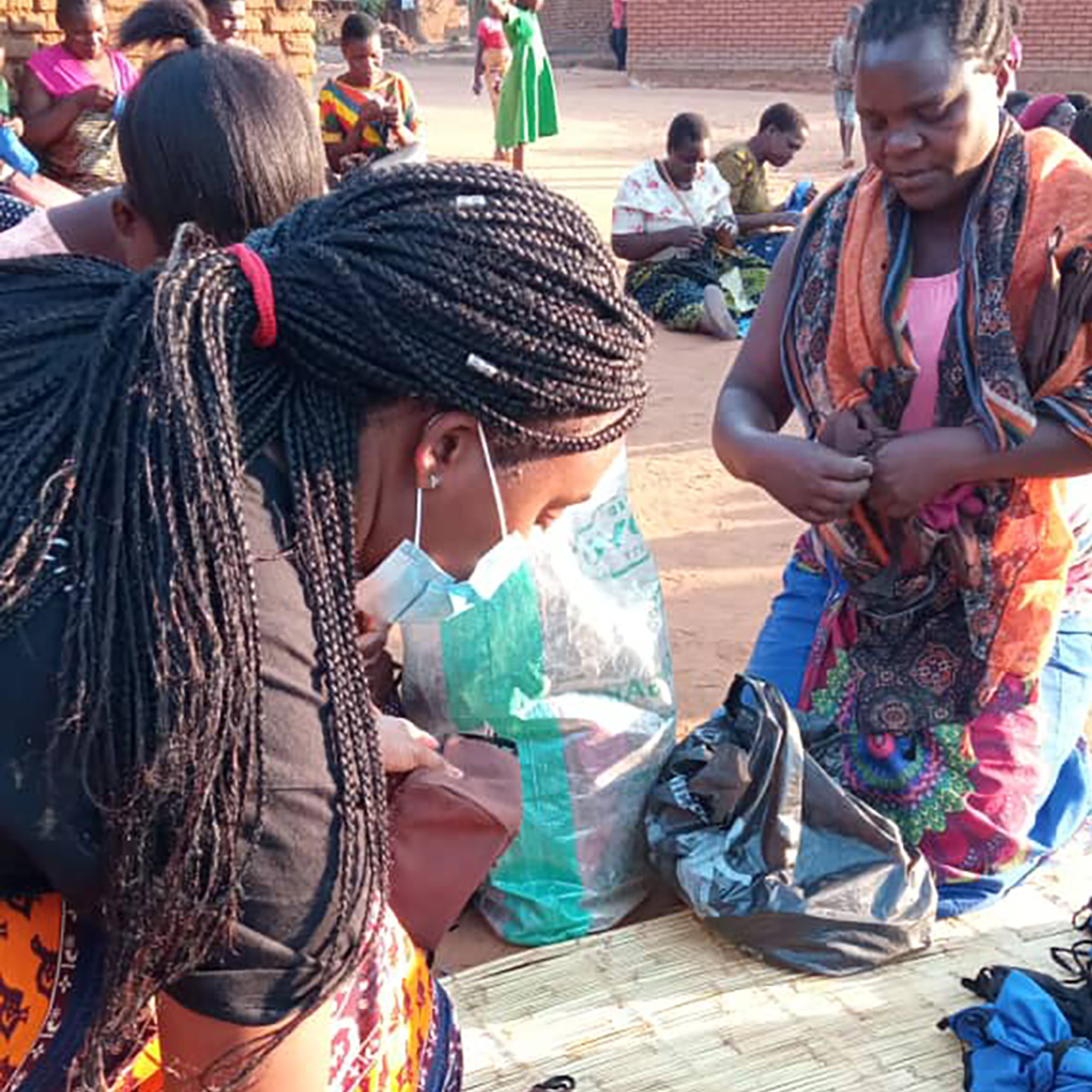
When the Bunda community couldn’t afford masks to prevent the spread of COVID-19, the GHC Malawi COVID-19 Alumni Coalition hosted a mask-making workshop to provide life-saving PPE.
In 2020, longtime GHC partner Partners In Health (PIH) began building out its U.S. programming with several GHC alumni and former staff at the helm. PIH-US Executive Director Katie Bollbach, GHC’s founding Program Director and former Vice President of Programs, cites a long history of mutual learning, infusions of talent, and a shared commitment to leading with humility between the organizations.
When COVID-19 hit the U.S. in early 2020, PIH was tasked with aiding state and local-level public health systems in the absence of a cohesive national emergency response. To launch the United States Public Health Accompaniment Unit, Katie and her team looked to pandemic experts in the GHC community who played a key role in addressing previous outbreaks throughout Africa to bring those lessons to PIH’s COVID-19 response strategy in the U.S.
One of the first people Katie called was Ameet Salvi, a 2009-2010 fellow and supply chain expert who had worked on the Ebola response in West Africa in 2015. Ameet was well-suited for a role as Senior Project Lead, helping to co-design a new surge contact tracing program with the Illinois Department of Public Health. His approach highlighted a deep commitment to equity:
“Our first priority shouldn’t be, ‘How do we solve the simplest cases? It should be, ‘How do we support the most complex and difficult ones? How do we design a program and implement it in a way that doesn’t leave the vulnerable as an afterthought?’”
-Ameet Salvi, 2009-2010 GHC fellow
Melissa Mazzeo, a 2013-2014 GHC fellow, also served as a Senior Project Lead where she supported vaccine rollout in New Bedford, Massachusetts, a city with deep inequities exacerbated by the pandemic. Like the many other GHC alumni working on COVID-19 response efforts around the world, Melissa rolled up her sleeves to do what had to be done, from mapping out strategy with city leaders to setting up tables in the clinic. She also channeled a community-centered approach to ensure misinformation didn’t hinder people from accessing the vaccine.
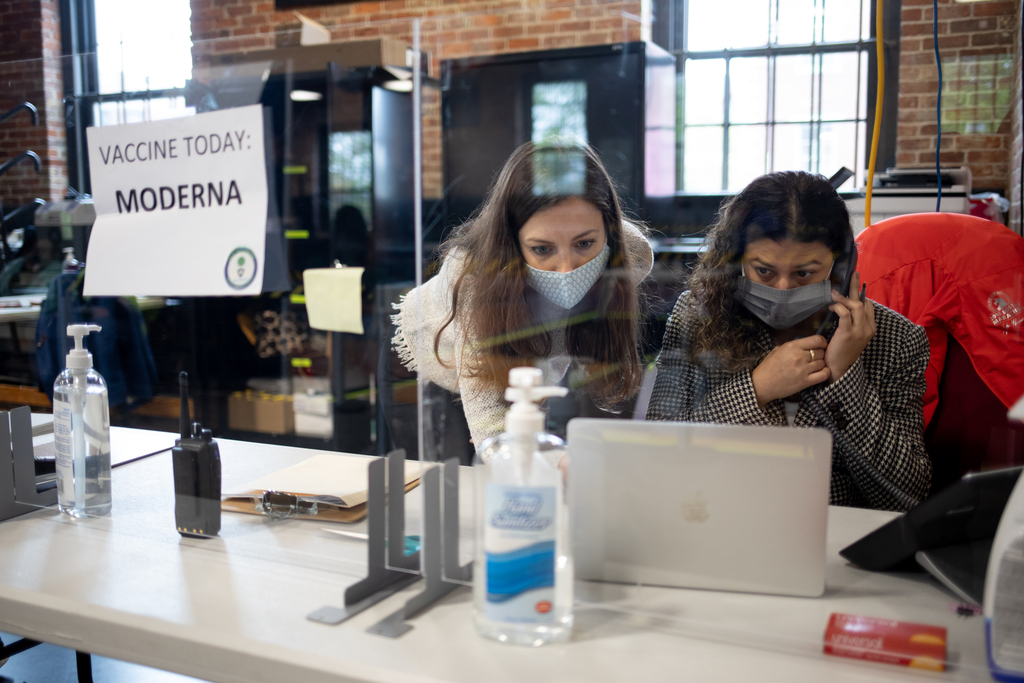
Melissa Mazzeo (left) and her colleague Solange Anderson make phone calls attempting to match remaining vaccine doses with community members before the clinic closes for the day. Through a collaboration between PIH-US and the Health Department, over a two-month period, New Bedford experienced a three-fold increase in vaccine demand and reduced the gap in first doses administered per capita between Hispanic and white residents by half. Photo by Zack DeClerk/PIH
Behind the scenes, 2014-2015 GHC fellow Rebecca Gifford was capturing stories and lessons learned to amplify impact as PIH-US’s Communications Lead. Her dedication to ethical storytelling and authentic partnerships has allowed countless others to be inspired and moved to action by GHC and PIH’s shared commitment to health equity.
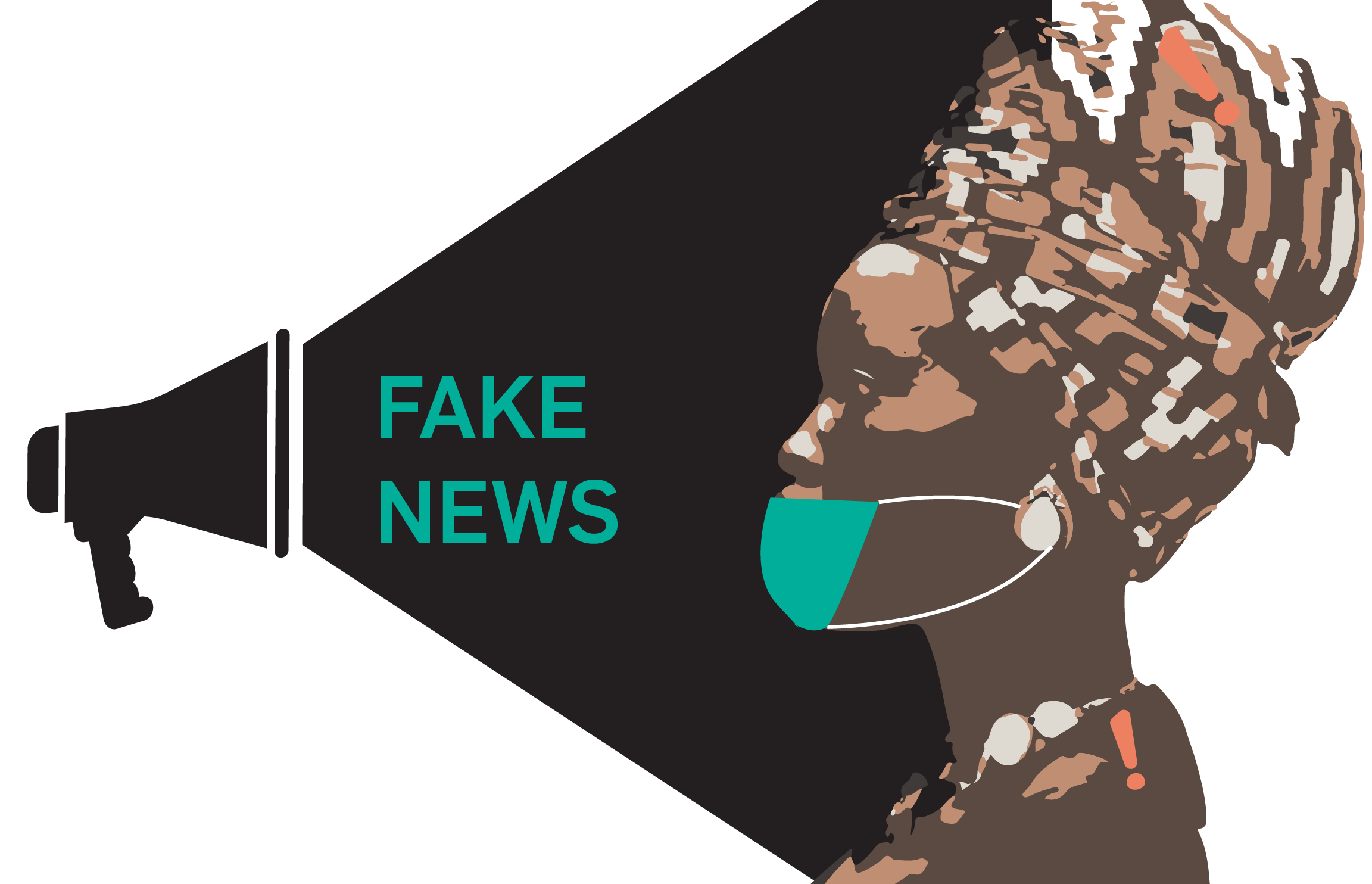
As vaccines entered the toolkit for responding to and protecting against COVID-19 this year, the GHC community around the world worked to advocate for more equitable access, address hesitancy and misinformation, strengthen supply chains for more efficient distribution, integrate COVID-19 vaccination into ongoing health interventions, and more.
2020-2021 fellow Mirriam Chimba tracked and documented SARS-CoV-2 sequencing and worked to overcome vaccine hesitancy as a Communications Officer at PATH.
2020-2021 fellow Revelation Nyirongo, a Medical Informatics Specialist at Partners In Health in Malawi, trained data collectors and ensured maintenance of Malawi’s COVID-19 tracking application.
Alumni Jacqueline Anena of Uganda, Sithembile Chithenga of Malawi, and Mwelwa Chasaya of Zambia shared their expertise on vaccine distribution and uptake in this edition of GHC SHIFT HAPPENS.
As Public Health Analysts at the Zambia National Public Health Institute, fellows Michael Phiri and Mwelwa Chasaya ensured that the Zambian population received accurate information about COVID-19 and the COVID-19 vaccine.
Chisomo Chikuni, a 2018-2019 fellow, is part of a research team at AMREF Health Africa focused on training community health volunteers in the use of an mHealth platform to combat COVID-19 in Malawi.
2020-2021 fellows Tresor Nkurunziza and Ibrahim Niyonzima supported managing COVID-19 vaccination sites to prioritize the most vulnerable populations in Rwanda.
2012-2013 fellow Sivan Wunder is working with the San Francisco Health Plan, leading efforts to get 85% of individuals with low incomes and undocumented status vaccinated.
In Zambia, 2020-2021 fellow Mwangala Nyambe leads an mPharma program to train pharmacy interns to promote increased uptake of the COVID-19 vaccine.
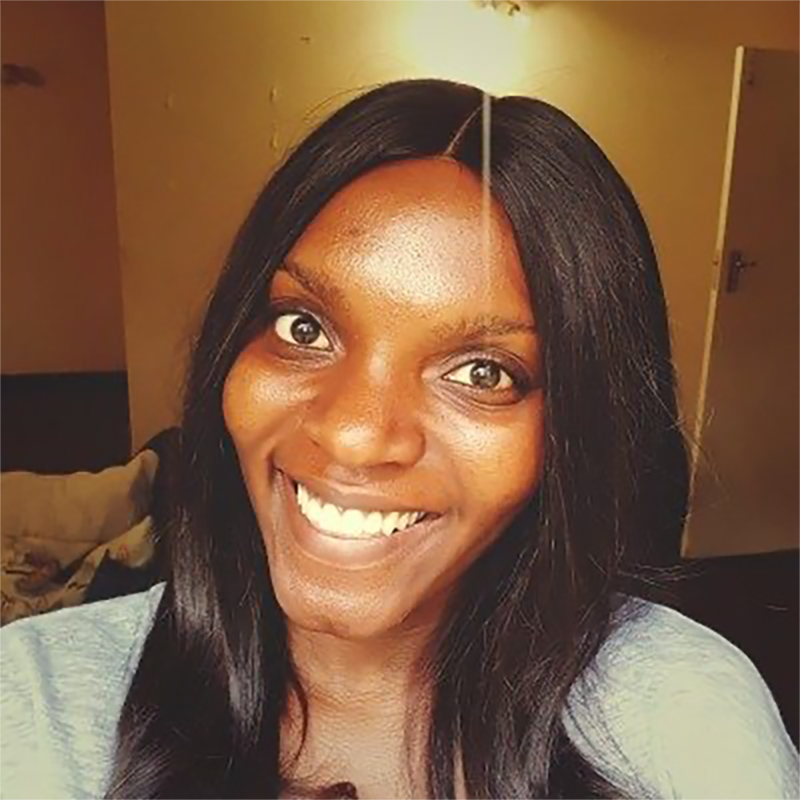
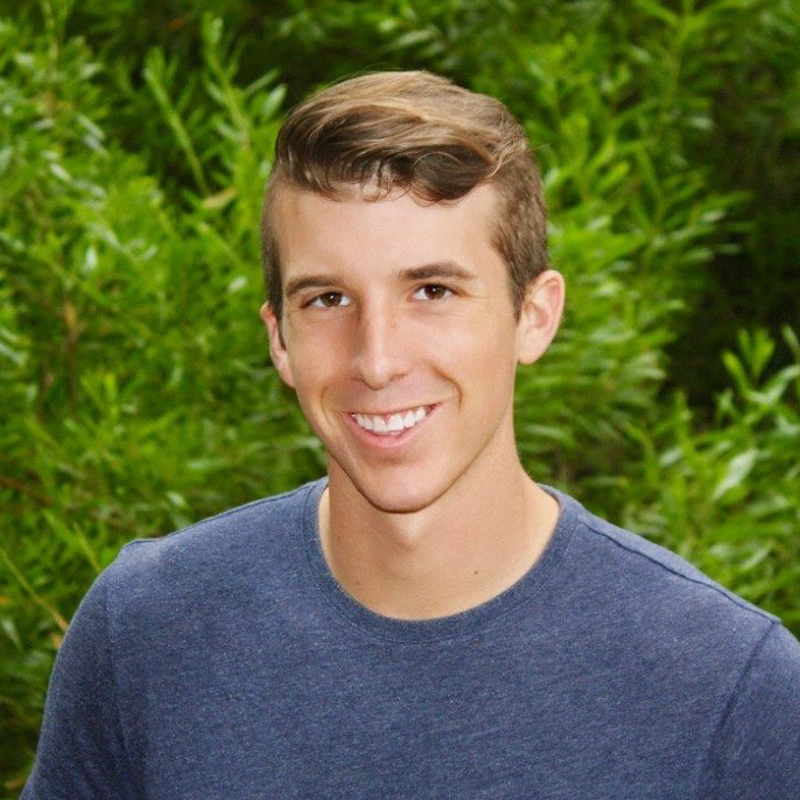
Lonnie Hackett and Angel Chelwa met when they joined GHC as fellows placed in Zambia in 2014. Lonnie, a recent college graduate from the U.S., and Angel, a young Zambian professional with an advocacy background, shared a deep commitment to health equity that far outlasted their fellowship year.
Post-fellowship, Angel joined the Zambia team of mPharma, an award-winning African startup focused on creating digital solutions to gaps in access to affordable medicine. As she rose to Managing Director, she applied her leadership expertise to support mPharma’s rapid growth across Africa. Lonnie stayed in Lusaka and co-founded Healthy Learners, an award-winning nonprofit that trains teachers to be community healthcare workers to ensure children are never denied quality healthcare access.
Over the past six years, Angel and Lonnie stayed connected and rooted for each other’s success. It didn’t take long though for an opportunity to collaborate once more to arise. With plans to scale Healthy Learners beyond Zambia, Lonnie’s team hired Angel as the new Vice President of Operations, where she’s bringing her managerial expertise to expand the organization’s impact.
Partner organizations contributed $475,000 in addition to the $1.7 million invested by Global Health Corps.
Our global team brings a wide range of perspectives, backgrounds, and skill sets to drive our mission of building and mobilizing a network of leaders to advance health equity.
Within our global team, our Senior Leadership Team (SLT) guides GHC toward achieving top priorities and ensuring effective cross-departmental decision making and resource allocation. The SLT is majority female and includes leadership from our East and Southern Africa offices and our U.S. office.
This year, we continued to intentionally grow our Board of Directors, recruiting committed and talented members from Malawi, Rwanda, Uganda, and the U.S. to join our movement. GHC’s Board comprises engaged leaders who bring expertise in healthcare policy, human rights law, media, marketing, finance, and business.
Collaboration is integral to responding to crises and building equitable health systems. We’re grateful to our dedicated partners in this work, from our 2021-2022 fellow placement organizations in Malawi, Rwanda, Uganda, and Zambia to our global partners in advancing our alumni program and championing leadership as a lever for change.
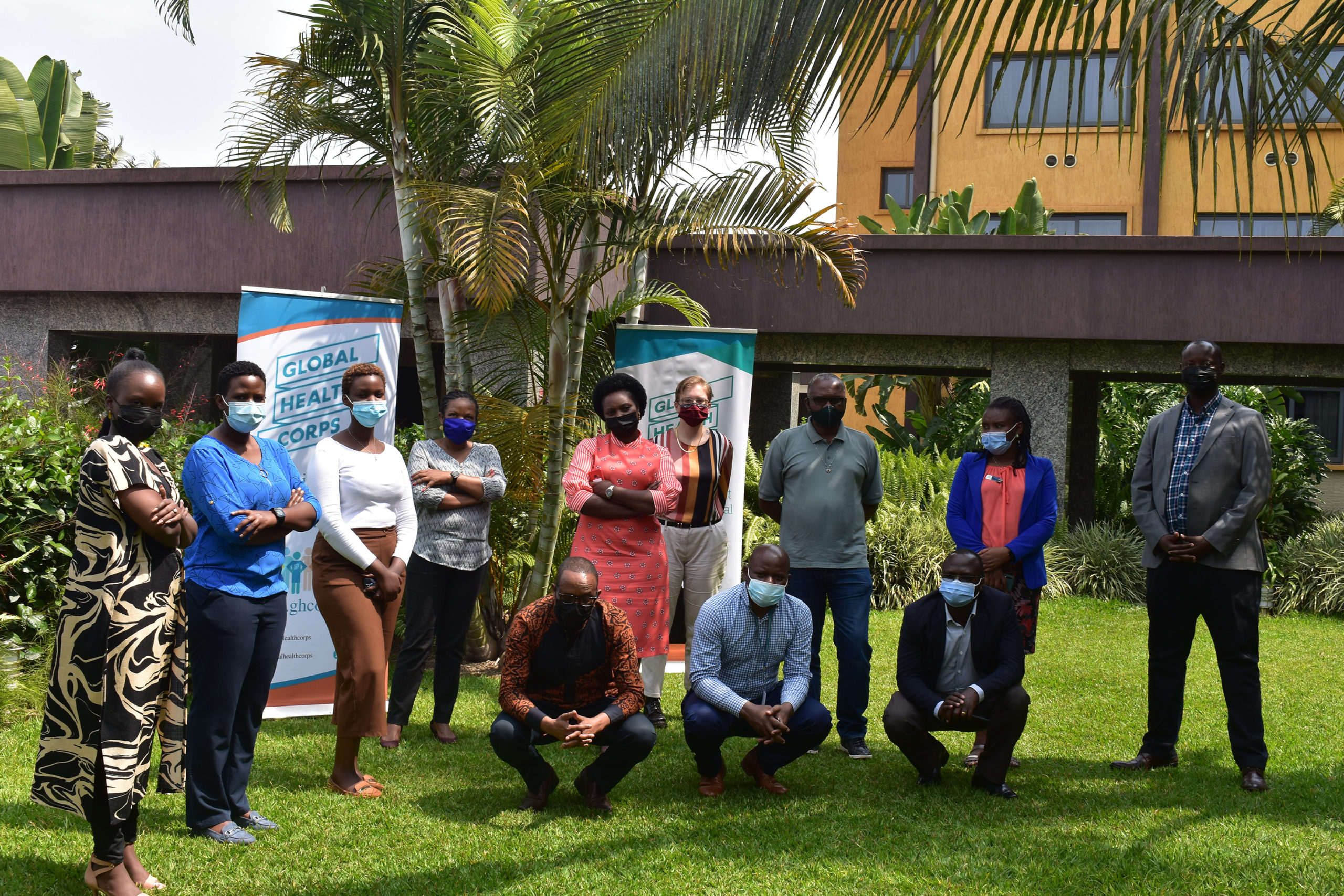
As the Omicron variant of COVID-19 spreads around the world, the GHC network of leaders is rising to the challenge of protecting and advancing health equity in their communities across East and Southern Africa and beyond. Your support enables their impact.
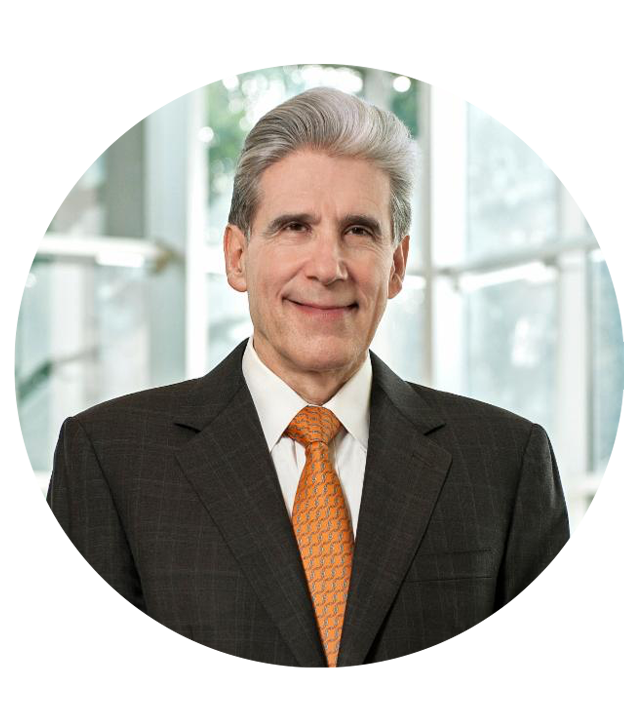
Without leaders, even the best designed systems will fail.
We’ll send periodic updates from our leaders working on the frontlines of global health around the world and share opportunities to get involved in the movement.
Global Health Corps is a leadership accelerator mobilizing a powerful network of health equity changemakers, 1200+ strong and growing.